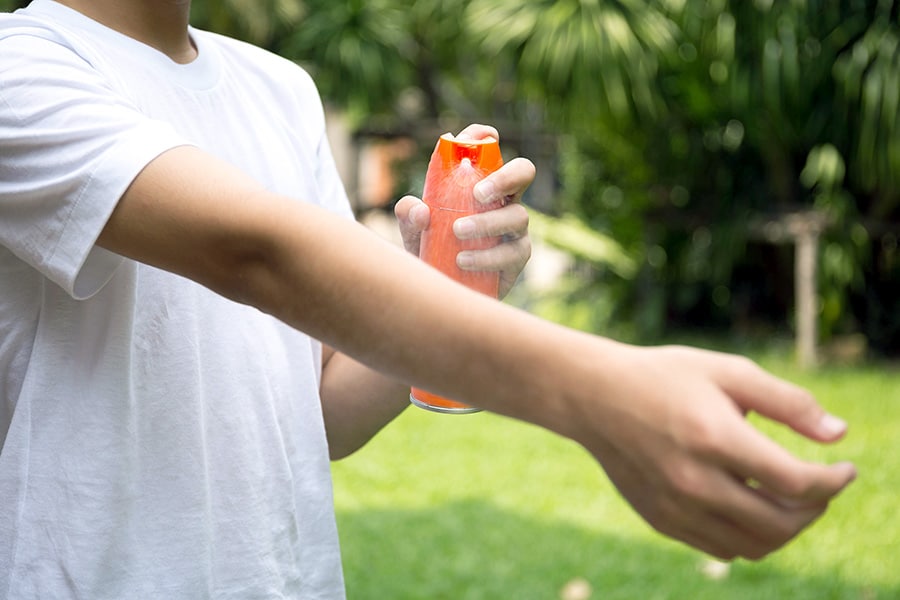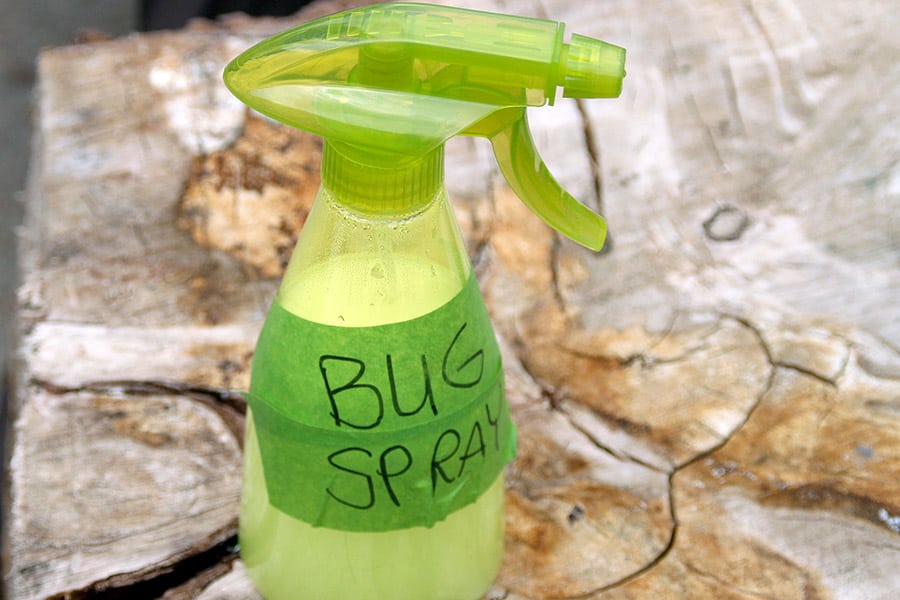
When you go camping, you will find plenty of wildlife, including insects. Most of them won’t bother you, but the biting bugs like mosquitos, no-see-ums, and ticks can be a real nuisance. They are potentially dangerous too. So today, we’re going to discuss the 20 best ways to keep the bugs away.
What is the best way to repel bugs when camping? We have put together this list of 20 ways to get rid of pests while you’re camping:
- Use bug sprays and creams
- Essential oils
- Clothing
- Coils and lanterns
- Start a fire
- Throw sage on the fire
- Look for a high and dry campsite
- Bracelets
- Screen rooms
- Vinegar
- Onions
- Don’t use scented hygiene products
- Candles
- Herbs
- Garlic
- Use coffee grounds to kill mosquito larvae
- Keep your campsite clean
- Bug zappers
- Electronic bug repellers
- Limit the light
Now let’s go through each method.
1. DEET-Based Bug Sprays And Creams
One of the easiest and effective ways to help keep the bugs away while you’re camping is to use bug sprays and creams. We have included other natural bug repellents on our list, but if all else fails, it’s a good idea to bring along some bug spray.
DEET is one of the most active ingredients found in traditional bug sprays. There’s been a lot of lies and misinformation put out about DEET over the years, but most scientists believe it can be used safely.
If you don’t want to use DEET for some reason, there are other bug sprays that you can use that contain other bug repellent ingredients like picaridin. You can read more about picaridin here.
This video from Consumer Reports shows some of the best products that work at keeping the mosquitos away. Their top choice is Sawyer’s Fisherman Formula, which contains picaridin. The runner up is Repel Lemon Eucalyptus, which includes 30 percent oil of lemon eucalyptus.
For products that contain DEET, Consumer Reports recommends Repel Family with 15 percent DEET and OFF! Deep Woods with 25 percent DEET.
While DEET is generally considered safe to use on anyone over the age of three, some people have had adverse reactions to it. The most often reported side effect is skin irritation. Of course, a mosquito’s bite also causes skin irritation.
Whatever type of bug spray you decide to use, look for a waterproof formula. And be sure that you always follow the instructions on the package. You want to keep bug sprays out of your eyes and mouth. Some bug sprays can potentially damage your eyes or even your clothes.
2. Essential Oils
Essential oils are another option that you have to keep the bugs away while you’re camping. If you want to avoid the strong chemicals in traditional bug sprays, then essential oils are an excellent natural alternative. Many essential oils have bug-repelling properties.
You can apply these essential oils directly to your skin, or you can spray them on your clothing.
Some essential oils that repel bugs include:
- Geranium
- Catnip
- Sage
- Cedarwood
- Eucalyptus
- Thyme
- Clove
- Citronella
- Basil
- Mint
- Lavender
- Cajeput
- Tea Tree
- Rosemary
- Lemongrass
To make a natural bug repellent using essential oils, you should mix 10 to 20 drops of the oil with a half cup of water in a spray bottle. Add one tablespoon of rubbing alcohol and a half cup of natural witch hazel. Before you use the mixture, be sure to shake the bottle because the oil and water will separate.
One of the things we love about using essential oils is that they don’t smell bad. But the best thing about them by far is that they keep those pesky bugs in check.

3. Insect Repellent Clothing
Insect repellent clothing is an option that is recommended by the CDC. You can wear any lightweight pants and long sleeve shirts to keep the bugs off of your skin. However, mosquitos and other insects can bite you through your clothes.
Your choices are either to spray your clothing with bug spray or essential oils or to buy clothing that has insect repellent in the fabric. It works quite well. One of the advantages of wearing bug repellent clothing is that you don’t have to use as much chemical bug spray on your skin.
The clothing will help. However, you will still need to use bug spray or essential oils on your exposed skin.
Here’s a shirt that we recommend to keep the bugs away. It offers a full spectrum of insect protection. And you can wash it 50 times before it starts to lose its effectiveness. We also recommend pants like these. You can even use a bug repellent scarf.
4. Mosquito Coils And Lanterns
Using mosquito coils and lanterns is another way to keep the bugs at bay while you’re camping. Mosquitos are one of the most annoying and potentially dangerous bugs that you will encounter while camping. Mosquito coils are excellent for keeping those pests away.
We recommend placing several of the coils around your campsite. The coils are pyrethrum-infused, and they put off a repelling smell and smoke when you burn them.
PIC makes some excellent mosquito coils. They are effective at keeping the mosquitos away, and each coil will burn for five to seven hours.
Mosquito repellent lanterns work pretty well too. They are camping lanterns that are made specifically for bug repelling. They work with a removable cartridge that emits a smell that pests don’t like. So you won’t find any nasty mosquitos anywhere near the lantern. One thing that I should mention is that the cartridges will have to be replaced every other day.
We recommend getting a lantern such as the Thermacell Cambridge mosquito repellent cordless camping lantern. This lamp will protect an area 15 by 15 feet surrounding the repeller.
5. Start A Fire
One of the easiest ways to keep the bugs out of your campsite is to start a campfire. This is a simple thing to do, and it works. Flies, mosquitos, and other bugs don’t like the smoke that the fire produces, and they will steer clear. Tiki torches work the same way.
If you want to make your campfire extra smokey, throw a couple of damp twigs on it.
You can kill two birds with one stone this way; you can grab the pie irons and make an easy meal while you have the campfire going. Read our post “What Is A Pie Iron?” to learn more.
Other Posts of Interest
- Should I Buy Or Rent A Van Camper?
- 7 Van Camping Destinations to Escape Winter
- 11 Best Options For Camper Van Toilets And Showers
6. Sage In The Campfire
While we’re talking about the campfire, I need to mention sage. Believe it or not, burning sage in the campfire is an excellent way to keep the bugs away.
There’s nothing tricky to it. You throw a stick of sage onto your campfire in the evening, and then sit back, relax, and watch it work miracles.
That one little stick of sage will emit a scent that is so effective at repelling insects that you may not need any other protection like chemical bug sprays. It lingers on your clothing, too, so you have some extra protection.
Some other plants that you can add to your campfire to keep the bugs away include:
- Lemon Balm
- Catnip
- Basil
- Lavender
- Peppermint
- Citrosum
- Rosemary
All of these plants work just like the sage. When you burn them, they emit a bug-repelling scent.
7. Look For A High And Dry Campsite
You will find lots of bugs at any campsite. But most of them won’t bother you. As we’ve discussed, the most annoying pest is the nasty mosquito. So if you can avoid them altogether, that is ideal.
According to the Mayo Clinic, “Bites from mosquitoes carrying certain viruses or parasites can cause severe illness. Infected mosquitoes in many parts of the world transmit West Nile virus to humans. Other mosquito-borne infections include yellow fever, malaria, and some types of brain infection (encephalitis).”
Finding a high and dry campsite is one thing you can do to avoid mosquitos. Pooled water is a breeding ground for them. It’s where the eggs develop into larvae. You will often see an increased number of mosquitos following a rainstorm.
If you’re trying to avoid mosquitos, then you should be careful not to set up camp near places that are wet like bogs and swamps. The further you are from areas where water stands, the better.
8. Bug Repellent Bracelets
Another way that you can keep the bugs away from your skin while you’re camping is to wear a bug repellent bracelet. The bracelets work by releasing repelling chemicals into the air around you.
The bracelets are super easy to use. You just put it on your wrist and forget about it. One of the benefits of wearing them is that you don’t need to spray any additional bug spray on your skin.
If you don’t want to wear the bracelet the entire time, you can also leave them out or hang them around the campsite. The bracelets should still protect you from bugs.
There are many excellent bug repellent bracelets on the market, try a couple different brands to see which one is effective for you.
It’s worth noting though that not all bug repellent wrist bands are equal. There are plenty of bracelets that don’t work at all. Your best bet is to find bracelets that are approved by the Environmental Protection Agency.
According to the Center for Disease Control, “the most effective way to protect against mosquito bites is to use only EPA-registered products, including those containing the chemicals DEET, picaridin, IR3535, and even the natural ingredients oil of lemon eucalyptus and para-methane-diol.”
9. Screen Rooms And Mosquito Nets
When you’ve tried oils, bug spray, clothing, essential oils, bracelets, and everything else on our list, but you’re still being bombarded by bugs, it’s time to get a screen room or mosquito net.
Screen rooms are primarily large tents with screened-in walls. They allow you to enjoy your surroundings without worrying about biting insects. You can still see the view and feel the gentle breeze on your skin with screen rooms. But the best thing about screen rooms is that they are super effective at keeping the bugs out.
We recommend this screen room from Luxe Tempo. This tent is virtually bug proof.
Another option you have is to put a mosquito net around your cot or chairs. This is a way that you can make your own screen room.
One thing worth remembering is that while these nets and screens work effectively at keeping the bugs away, they won’t work if you don’t leave the screen closed. You should always quickly zip up your tent when you enter or exit.
10. Spray Vinegar
If you don’t want to put chemicals like DEET on your skin, there are some easy natural bug repellents that you can use. One of those is vinegar. One of the best tricks you can do to keep the bugs away is to spray some vinegar outside of your tent.
Bugs hate the smell of it so you can sleep well, knowing that the insects won’t go near it. Before you leave for your camping trip, fill a couple of spray bottles with vinegar, and you’re good to go.
The only downside of using vinegar is that the strong smell can sometimes be too much for humans also. If you’re camping with people who are sensitive to smells, then be careful not to spray too much.
11. Rub Yourself With Onions
Speaking of natural bug repellents, another option you have is to use onions. This one may not be too pleasant if you’re sensitive to strong smells, but it certainly is effective.
One way you can use onions to ward off the bugs is to eat it. However, for it to work, you would have to eat a lot of onions. So another option you have is to rub onion juice on your exposed skin.
The onions work in the same way the vinegar works. Bugs hate the smell. But like the vinegar, it can be offensive to humans with sensitive noses. Or humans in general.
12. Don’t Use Scented Hygiene Products
The problem with using scented hygiene products is that bugs are attracted to the smells. Insects find most perfumes, colognes, shampoos, hair care products, and deodorants irresistible. So you should avoid all of them while you’re on your camping trip.
If you can’t go without your grooming products while camping, then consider using unscented or all-natural products. The natural cleaning products don’t have a strong scent. And they also don’t contain the chemicals that other commercial products have in them.
13. Bug Repellent Candles
Candles create a beautiful ambiance while you’re camping. But they’re not just for looks. You can also use candles to get rid of bugs. There are several different types of candles on the market that will repel insects. But the most popular of them is the citronella candle.
Citronella candles are another natural way to keep the bugs under control.
The citronella oil is very effective on bugs. One thing you can do is to purchase small citronella candles or tea lights and put them into jelly jars. Then place those jars all around your campsite to keep your living space bug free.
I need to mention that citronella candles aren’t the strongest defense against bugs. They won’t keep away the masses. But they do offer some protection. Your best bet is to use them along with some of the other remedies on our list.
One of the best citronella candles on the market is the Cutter Citro Guard candle.
14. Herbs Are Not Just For The Kitchen

To reduce your environmental footprint, consider using some herbs from the kitchen. Some of them work by emitting a scent that bugs don’t like. Others use the oil that is found in the plant to repel insects.
The top plants that will send the bugs packing include:
- Citronella Grass: Repels stable flies, mosquitos, and leeches
- Rosemary: Repels cabbage loopers, carrot flies, mosquitos, and Mexican bean beetles
- Chives: Repels carrot flies, Japanese beetles, aphids, slugs, ants, and fleas
- Garlic: Repels root maggots, slugs, mosquitos, and aphids
- Lemon Grass: Repels mosquitos and flies
- Basil: Repels carrot flies, asparagus beetles, mosquitos, and whiteflies
- Cedar Trees: Repels fleas, ticks, ants, mosquitos, moths, and cockroaches
- Catnip: Repels mosquitoes, aphids, ants, beetles, weevils, and cockroaches
- Mint: Repels moths, ants, fleas, squash bugs, cabbage looper, aphids, beetles, and flies
- Lavender: Repels mosquitoes, fleas, flies, moths, and scorpions
15. Eat Garlic And Onions
Bugs are a lot like Dracula. Neither of them likes garlic. So one thing you can do is to eat a lot of it. You can also take a garlic supplement. Bugs are repelled by both the smell and taste of garlic.
It works by masking your natural body odor and sweat, both of which attract bugs.
You can either eat the garlic or hang a string of it at your campsite. All of these methods will repel bugs.
I mentioned rubbing onion on your skin earlier. However, that’s not the only way you can use onions to keep the bugs away. You can also eat it or place it in a bowl of water.
While it’s true that garlic and onion will repel bugs, they could also repel people. So you’ll have to weigh that if you choose this method.
If you’re turned off by the strong smells of onion and garlic, another thing you can do is to take vitamin B supplements. Zinc works the same way. You should start taking vitamin B or zinc weeks before your camping trip to make it the most effective.
These 2 supplements work well for some people and not so well for others. Apparently, body chemistry has a lot to do with it.
16. Throw Coffee Grounds On Stagnant Water
Remember what I said about standing water being a breeding ground for mosquitos? Water is one thing that you should avoid when you’re choosing your campsite. But sometimes you can’t help but to camp near standing water.
Mosquitos lay their eggs in stagnant water like puddles. If you plan on camping for a few days, you could be in for an invasion if you’re not careful. However, there is one thing that you can do to kill all of the eggs before they hatch. Throw coffee grounds on the water. Yes, really.
Not only will the coffee grounds kill the mosquito larvae, but it will also provide beneficial nitrogen to the plant life.
Van Camping Life Tip: Bring along aloe vera. Aloe is excellent for bug bites and stings. It will even double as a soothing treatment in case of burns.
17. Keep Your Campsite Clean
Keeping your campsite clean is another critical step in controlling the bugs. If you leave out food or unwashed dishes, the smell will attract both insects and wild animals. Leaving food out is like a personal invitation for critters to come on by for a snack.
It’s safer all the way around if you keep your camp as clean as possible.
If you want to avoid bugs, some of the things to keep in mind are:
- As soon as you’re done with your food, you should either dispose of it or store it in a large plastic container with a tightly sealed lid
- Get rid of your trash and don’t leave it uncovered
- Once you get to your campsite wipe down the table and then wipe it down again after every time you eat
- Be sure that all of the dishes are washed as soon as you finish eating
- Be sure that there is no food left out anywhere before you go to bed or leave the campsite
18. Use A Bug Zapper
Bug zappers are another option you have to repel the bugs while you’re camping. They work by attracting insects with ultraviolet light. An interesting fact is that many bugs see ultraviolet light better than they see visible light.
When the bugs go near the zapper, they get met with a high-voltage electric current that kills them. You will often hear a loud “Zzzzap” every time this happens. It’s not unusual for bug zappers to kill more than 10,000 bugs in a single night.
Bug zappers work the best on bugs that are most attracted to ultraviolet light.
We like the Bug Bulb 2 in 1 Camping Lantern. This bug zapper will attract and kill flies, mosquitoes, and gnats. It’s cordless, compact, portable, and safe for children and pets.
19. Electronic Bug Repellers
Electronic bug repellers can also be useful for some bugs. These ultrasonic devices work by emitting high-frequency sounds that bother pests. Because the sound is bothersome to insects, they will avoid the area protected by the device.
Ultrasonic devices are popular with some people, mainly because they are so easy to use. They aren’t bothersome to people because they are silent to human ears. You can also find subsonic and electromagnetic devices. These designs vary by frequency, rate, and intensity. They also vary in how well they work.
Studies have shown that these electronic bug repellers work in some cases. However, they are not effective on all bugs. If you want to try out one of these devices, your best bet is to have some backup method of bug-repelling to use with it.
If you’ve got some source of power, we like the Thermacell Patio Shield mosquito repeller. It provides a15-foot zone of protection against mosquitoes, and it is safe to use around people and pets.
20. Limit The Light
Many insects are attracted to the light, so if you want to keep them away from your campsite, you need to limit the light, or the type of light, that you use.
The thing is, some bugs are repelled by light, while others are attracted to it. The difference is determined by phototaxis. Phototaxis is a scientific term for how an insect’s body will react to light.
If a bug is attracted to the light, it has a positive phototaxis. Pests who are repelled by the light have a negative phototaxis. The insects that are phototaxis negative are nocturnal insects like cockroaches and earthworms. Most flying insects like mosquitos are the opposite. They will go toward the light every time.
For this reason, you should be cautious about using a flashlight or lantern (unless it’s a bug-repelling lantern). And you should keep the lights off when you’re entering or exiting your van.
It All Comes Down To This
As you can see, there are various things that you can do to keep the bugs away from you and your campsite. Some of them work better than others. They all work better when you use more than one of them together.
But the truth is, there is no one perfect bug repeller. And while these methods will work most of the time, there is always a chance that you’re still going to be bitten. Because of this, we suggest that you bring along a first aid kit that includes bug bite cream or ointment.
Now that you know these bug fighting tips, it’s time to use them. Many beautiful areas in the world are full of bugs. But if you follow our suggestions, then you will be able to enjoy them in peace. If you do get a bite now and then, don’t sweat it. It’s all a part of the adventure.






